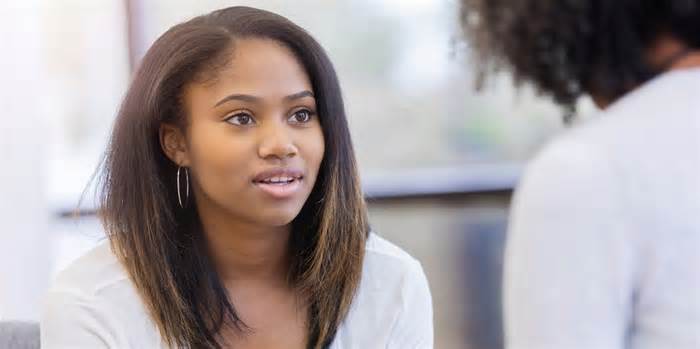These expert-backed options will get you started on the path to healing.
Living during a global pandemic is traumatic. It’s even more so for Black women and girls who tend to hold up the Black community as we continue to face racism and racial injustices in this country.
Feelings of anger, rage, and frustration can all be signs of trauma, says Psychiatric Nurse Practitioner Linda Winful. Therapy is a great way to work through those feelings, but misconceptions that seeking help is a sign of weakness unfortunately stop many Black people from exploring this option.
“Therapy, more or less, gives you the avenue to speak how you feel,” Winful says. There is a saying a problem shared is a problem half solved. That’s why a listening ear from a neutral third party can be particularly powerful, Winful says.
For Black women and girls looking for mental health resources, Winful says it’s important to find a provider or practice you connect with. If you don’t vibe with one person or style, try another. Price also tends to scare people away, but Winful notes there are options for everyone. For those with insurance, she suggests calling to find out exactly what your provider can cover. Additionally, many mental health services are offered on a sliding scale. Hospitals are also a great place to inquire about free resources within your community.
“Let’s keep our minds open and check in with our own emotions,” Winful says. Below are six mental health resources for Black women and girls to help you get started on a path to healing.
Founded by Jasmine Marie, black girls breathing provides breathwork classes for Black women. This meditation technique can be a powerful way to shift energy through the body to release internal stress and trauma. Currently, black girls breathing offers virtual breathwork circle sessions twice a month. Sessions are priced on a sliding scale, including 75 no-costs slots for those in need. Find out more on the black girls breathing website and Instagram.
The National Queer and Trans Therapists of Color Network (NQTTCN) offers a digital directory to help users connect with queer and trans mental health practitioners of color. With more than 140 psychotherapists in the directory, NQTTCN’s goal is to increase access to healing for the queer and trans community and promote social justice. The site also offers additional resources such as emergency hotlines for LGBTQ+ and a newsletter.
Download it at the App Store or on Google Play.
As the name says, The Safe Place App was created as a mental health space and resource for the Black community. Jasmin Pierre created the app in 2018, after years of quietly dealing with mental health issues. “I’m a suicide survivor, with major depressive disorder, and anxiety issues,” Pierre says. “We were not really taught about mental health in the Black community. We were taught to just be strong and pray.” Pierre wants to change that. Her goal is to spread awareness and resources about mental health for the Black community and break the stigmas that persist. The app contains many valuable resources including self care tips, voice guided meditations, Black mental health statistics, and information about racial trauma and how to care for yourself when viral videos showing police brutality surface. The Safe Place App is free to download and available for both iPhone and Android users.
In response to the direct impacts COVID-19 continues to have on the Black community and larger trauma caused by racial injustices, Taraji P. Henson’s foundation is offering free virtual therapy support. The foundation is named after Henson’s’ father, who suffered from mental health challenges. “BLHF is breaking the silence by speaking out and encouraging others to share their challenges with mental illness and get the help they need,” Henson wrote in a letter on the website. “African-Americans have regarded such communication as a sign of weakness and our vision is to change that perception.” Check the Boris Lawrence Henson Foundation website to register when free therapy slots are available.
Download it at the App Store or on Google Play.
The Ayana app connects users with licensed therapists based on your background, needs, and identities. The app was created by Eric Coly specifically to help marginalized communities, people of color, those who identify as LGBTQ+, and disabled individuals. By matching users with therapists who have similar identities and share their culture, Coly hopes this will break down the barriers that typically stop people from accessing mental health resources.
Therapy for Black Girls is a space with a handful of resources to support the mental health and wellbeing of Black women and girls. The site has a directory to help match users with therapists. Additional resources include options to subscribe to a monthly community to connect with others and a blog. Therapy for Black Girls also offers a weekly podcast on any and everything related to Black Mental Health. Host Dr. Joy Harden Bradford, a licensed psychologist, covered relationships, processing grief, and parenting during a pandemic on recent episodes.

